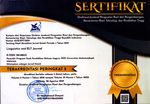Students Perception on the Integration of Task-Based Learning and Dubbing Short Video in Learning Speaking Skill
Abstract
Keywords
Full Text:
PDFReferences
Albino, G. (2017). Improving Speaking Fluency in a Task-Based Language Teaching Approach : The Case of EFL Learners at PUNIV-Cazenga. Sage Open, 7(2).
Benedict Michel (1999). Commentary: The Doorway of Perception, The Prose Poem: An International Journal: Vol. 8, Article 66.
Blake, R & Sekuler, R. (2006). Perception. New York: McGraw Hill.
Brown, H. D. (2004). Language Assessment Principles and Classroom Practices, 141. San Francisco: states University.
Burston, J (2013).Dubbing Video Projects in the Foreign Language Curriculum. Calico Journal, Vol. 23, No. 1.
Butarbutar, R. (2021). Learner’s perception of task difficulties in technology-mediated task-based language teaching. English: Journal of Language, Education, and Humanities, 9(1), 129-144.
Creswell, J. W. (2018). Research Design: Qualitative, Quantitative, and Mixed Methods Approaches. Los Angeles: SAGE Publications.
Darmadi, H. (2015). Assessing Procedure Text Through Simulation To The Tenth Grade Students Of SMK Al-Madani Pontianak. An Article For Tefl Assessment.
Dewi, K. (2016). The Correlation of SMA Students’ Habit in Watching Movie and their Speaking Skill. Mendidik : Jurnal Pendidikan dan Pengajaran,. 2(2).111-118.
Florente, Irene L. (2016). How Movie Dubbing Can Help Native Chinese: Hamline University.
Frost, R. (2004). A Task-based Approach. Turkey: British Council.
Harmer, J. 2007. The Practice of English Language Teaching. Edinburg: Pearson Education Ltd.
Hastuti, E. D. (2015). An analysis on subtitling strategies of Romeo and Juliet movie. Register Journal, 8(1), 57-80.
Herlina, H. (2014). Improving Students' Speaking Skill Through Audio Visual Media at 4 Th Grade of Labschool Elementary School East Jakarta. In 2nd International Conference on Education and Language, 87-96.
Leavy, P. 2014. The Oxford Handbook Qualitative Research. United State of America: Oxford University Press. p.2.
Liekas, E. D. (2022). Students’ Perception of Using Video Dubbing Technique for Speaking Skill in Guang Ming Seventh Junior High School Jambi. JELT: Journal of English Language Teaching, 6(1), 24-30.
Manurung, S., & Pohan, A. E. (2019). Students' Perceptions Towards the Implementation of Video Dubbing in Teaching Speaking. Anglo-Saxon, 10(2), 288-296.
Michel, B. (1999) "Commentary: The Doorway of Perception," The Prose Poem: An International Journal: Vol. 8, Article 66.
Nita, A., & Rozimela, Y. (2020). The Use of Task-Based Learning to Enhance Speaking Skill of Senior High School Students. In Eighth International Conference on Languages and Arts (ICLA-2019) (pp. 161-165). Atlantis Press.
Richards, J. C., & Rodgers, T. S. (2001). Approaches and Methods in Language Teaching. USA: Cambridge University Press.
Rifa’at, A. A. (2018). Stimulating You To Speak; A Strip Story As A Technique In Teaching Speaking. English And Literature Journal, 5(1), 12–21.
Riskiwati, N. I. M. (2022). The Implementation of a Task-based Learning Strategy by Making a Video Introduction to Improve Students’ Speaking Skills in the Seventh Grade of SMPN 2 Siliragung in the Academic Year 2021/2022. Doctoral dissertation, Institut Agama Islam Darussalam Blok Agung Bayuwangi.
Swan, M. (2005). Legislation by Hypothesis: The Case of Task-Based Instruction. Applied Linguistics 26 (3), 376–401.
Wakefield, J. (2014). Dubbing as a Method, For Language Practice and Learning. Language Arts in Asia 2: English and Chinese Literature, Drama and Popular Culture, Cambridge : Scholars Publishing.
Wati, I. M., & Rozimela, Y. (2019). The Use Of Dubbing Video Technique For Improving Students Speaking Skill and Confidence of Senior High School Students. Journal of English Language Teaching, 8(1), 259-269.
Widdowson, H.G. (1978). Teaching Language as Communication. London: Oxford University Press.
Willis, D., & Willis, J. (2007). Doing Task Based Teaching. New York: Oxford University Press.
Zaden, James. W Wander. (1984). Social Psychology. New York: Random House.
DOI: https://doi.org/10.31764/leltj.v12i2.28564
Refbacks
- There are currently no refbacks.
Copyright (c) 2024 Jauhar Helmie, Ghina Salsabila Setiawati, Vina Aini Salsabila

This work is licensed under a Creative Commons Attribution-ShareAlike 4.0 International License.
_____________________________________________________
Linguistics and ELT Journal
p-ISSN 2339-2940 | e-ISSN 2614-8633

LELTJ is licensed under a Creative Commons Attribution-ShareAlike 4.0 International License.
_____________________________________________________
LELTJ is abstracting & indexing in the following databases:
_____________________________________________________
LELTJ Editorial Office:













